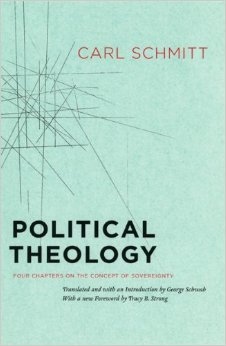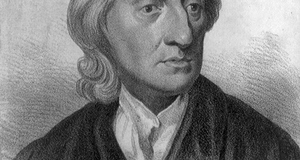Theories of Multicultural Toleration: An Examination of Justice as Fairness and Political TheologyAn Overview of Political Theology by Carl SchmittThe goal of Carl Schmitt in Political Theology is to give a justification of a strong sovereign state and to examine the conditions under which this sovereign would draw its power from. Schmitt’s analysis begins with the statement “sovereign is he who decides on the exception” (Schmitt, 1985: 5). Schmitt’s theory of sovereignty in Political Theology revolves around his idea of the decision and the exception. Schmitt does not give an abstract definition of sovereignty but rather looks into the concrete application of sovereign power. The exception as Schmitt sees it is not a codified occurrence, but is a case of peril and danger to the existence of the state which requires the sovereign to act. (Schmitt, 1985: 6) The exact details of this type of emergency cannot be foreseen, and therefore there is no judicial competence to deal with the exception. (Schmitt, 1985: 7) Sovereign power is demonstrated in deciding in a situation of conflict where the public interest and the interest of the state lies (Schmitt, 1985: 6).  As the exception is not formally codified in law, the sovereign is also the one who decides if there is an exception. (Schmitt, 1985: 13) In addition, the sovereign may stand outside the legal system to deal with an exception if necessary. (Schmitt, 1985: 12) Schmitt claims that in an exception “the law recedes while the state remains” (Schmitt, 1985: 12) meaning that while the sovereign may stand outside the legal system when deciding on an exception, the apparatus of the state remains as the sovereign must still suspend the constitution. In the event of an emergency, the only thing a constitution has the power to do is describe who can act in response to it. (Schmitt, 1985: 7) Because of this, Schmitt saw modern constitutional development as trying to eliminate the sovereign by giving no one extrajudicial power in the case of an emergency. (Schmitt, 1985: 14) While the case of the emergency is used to demonstrate the decision on the exception, the exception is not limited just to emergencies but is a general concept in the theory of the state. (Schmitt, 1985: 5) This means that the sovereign consistently decides on situations that may constitute exceptions while not being emergencies. (Schmitt, 1985: 12) As Schmitt puts it, “every legal order is based on a decision.” (Schmitt, 1985: 10) This idea of decisionism is gives power to the sovereign and by extension, the government. Schmitt makes a clear distinction as to the exception being different from anarchy and chaos. In the case of the exception, it is only the norm that is removed to protect the state but order is still present. (Schmitt, 1985: 12) This removal of the norm is what separates a normal legal order from the exception. (Schmitt, 1985: 13) Decisionism is still shown in the normalcy of a legal order as the sovereign is still the one who makes the decision as to whether a normal situation exists. As Schmitt states, “every general norm demands a normal” (Schmitt, 1985: 13) and the sovereign is the one who decides the normal. Schmitt sees this decision of legal normalcy as a crucial function and indication of sovereignty as “all law is “situational law”… the sovereign produces and guarantees the situation in its totality… he has the monopoly over this last decision.” (Schmitt, 1985: 13). The power to define legal normalcy is the core of Schmitt’s sovereign decisionism, with true sovereign power being “not as the monopoly to coerce and rule, but as the monopoly to decide” (Schmitt 13). To Schmitt, the decision in the case of an exception is “most clearly the essence of the state’s authority” (Schmitt, 1985: 13) as “the exception is that which cannot be subsumed” (Schmitt, 1985: 13) and it is for this fact that it shows the decision at its most pure level. (Schmitt, 1985: 13) Schmitt finds that the exception is much more relevant than the normal because it proves both what is considered normal as well as proving that an exception exists. (Schmitt, 1985: 15) This is why Schmitt determines that decision in the case of an exception is the true indicator of sovereignty.Schmitt characterizes the sovereign as “of all juristic concepts… the one most governed by actual interests.” (Schmitt, 1985: 16) This is important because of the sovereign’s place in making the decision and amplified because of the “influence this conception of personality and its connection with formal authority [arise] from a specific juristic interest” (Schmitt, 1985: 30). Schmitt points out that “such a decision in the broadest sense belongs to every legal perception” (Schmitt, 1985: 30), making the interests that influence the sovereign of key importance in the application of sovereign power by making the decision. In the third part of Political Theology, Schmitt states that “All significant concepts of the modern theory of the state are secularized theological concepts” (Schmitt, 1985: 36) This means that all the apparatus of the state have an origin in theological ideas but became secularized over time. Over the course of this secularization, the legitimacy of a legal order has come to be judged through a type of natural morality rather than by a single religious doctrine. (Schmitt, 1985: 48) However, Schmitt comes back to the idea that proof of sovereignty in the secularized state is still always most purely demonstrated in the deciding of the exception. Multicultural Toleration in Political TheologySchmitt’s decisionist theory as presented in Political Theology presents a compelling take on multicultural toleration when it is applied to this subject. Schmitt believed that all facets of the modern state come from theology and have merely been secularized, and this has huge implications for multicultural toleration. First, a theological construct in the sense that Schmitt means it does not strictly apply to religious beliefs, but rather can be extended towards any preexisting theological conception of the world. Multicultural toleration deals with the coexistence of a diversity of beliefs and conceptions of the good. Furthermore, a neutral and unbiased state is seen as a requirement for this type of coexistence to persist. Schmitt’s theory would refute this because if all concepts of the modern state are developed from some strain of theology, the question is raised as to which political conception out of the diversity was secularized to create the political constructs. This influence makes it difficult to say that the state is truly unbiased as at its core, it still bears a secularized theological influence. In a multicultural society, is it likely that the values of some groups conflict, causing societal tension. The problem that having dominant theological influence on the political machine creates is that at some point, the values of one of the societal groups will likely conflict with those of theology that was secularized to form the state. When the concept of multicultural toleration is applied to Schmitt’s theory of the theologically secularized state, it is clear that the theological backing of the state would potentially be a source of tension between the government and diverse groups. In the essence of Political Theology, it can be construed that the idea of the neutral state is impossible because in making the decision, the sovereign will always be influenced by the theological conception that was secularized to create the political apparatus. (Schmitt, 1985: 6) The theological influence in the secularized state shown by Schmitt poses a significant problem for an endorsement of multiculturalism by the state when coupled with the sovereign power of the decision. The sovereign decision is seen as an indication of the power of the sovereign, and that the most pure form of the decision is in deciding the exception. (Schmitt, 1985: 6) These decisions have a strong effect on the running of the state and the quality of life for its citizens as “every legal order is based on a decision.” (Schmitt, 1985: 10) Decisionism would seem to create a conditional endorsement of multicultural toleration, as groups would be free to have their own conception of how to live their lives but this conception would be subject to the sovereign decision. Schmitt’s belief in the sovereign being “of all juristic concepts… the one most governed by actual interests” (Schmitt, 1985: 16) makes it clear that the sovereign is governed by a specific theology, and that this theology would have a role in making the decision. The idea of multicultural toleration can work with the idea of a neutral sovereign making the decision in order to protect the state, but would not be compatible with a sovereign decision maker under the influence of a theological construct as it would likely conflict with one of the diverse groups existing in the mosaic. This is not multicultural toleration as groups are not truly free when their ideas are tolerated merely as long as they are compatible with the sovereign decision. This influence of a dominant theological conception can also be extended to the condition of normalcy in society. In Schmitt’s conception of society, normality is only as it is defined by the sovereign, not how it is viewed by the people. (Schmitt, 1985: 13) This poses a problem for multicultural tolerance because in order to be considered the norm in a state, it must be deemed normal by sovereign decision. Schmitt placed utmost importance on the decision in the case of the exception and in the case of an exception, said that “the law recedes while the state remains” (Schmitt, 1985: 12) meaning that sovereign is allowed to step outside of the boundaries of law to deal with it. This would pose a problem for multicultural toleration in the case that a belief or action on the part of a minority group became considered an exception requiring a decision. Even in a society where multicultural toleration was a codified part of the law, this would not matter under Schmitt’s theory as the sovereign would still have the ultimate power to step outside of the law in the case of the exception. This is problematic as the sovereign is influenced by interest, and at its core the sovereign will be biased in making any decision where the values that influence it conflict with the values of another group. Since the law is removed in an exceptional situation, this puts minority groups at risk to be harmed by whatever decision is made by the sovereign.Continued on Next Page » Suggested Reading from Inquiries Journal
Inquiries Journal provides undergraduate and graduate students around the world a platform for the wide dissemination of academic work over a range of core disciplines. Representing the work of students from hundreds of institutions around the globe, Inquiries Journal's large database of academic articles is completely free. Learn more | Blog | Submit Latest in Philosophy |
















